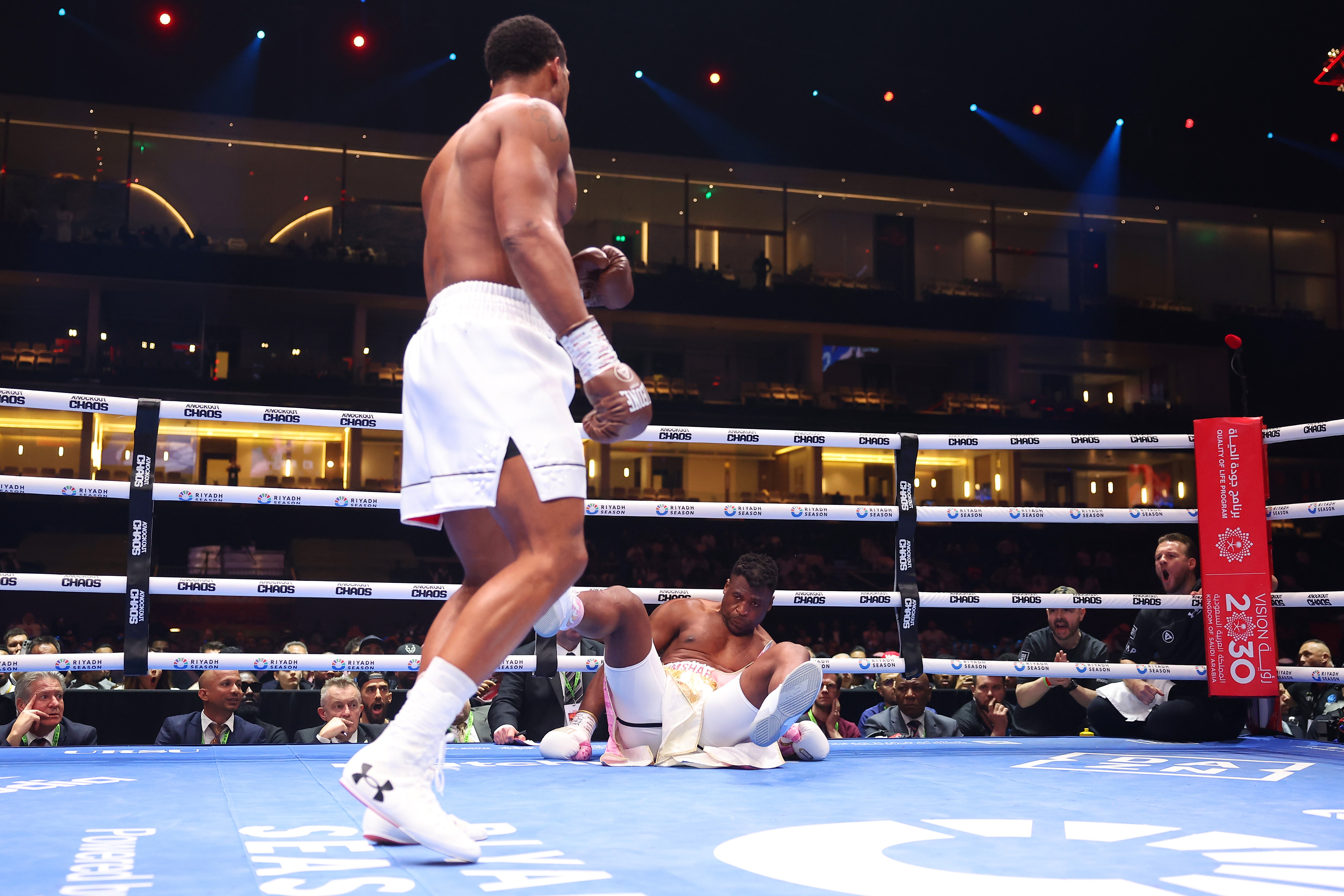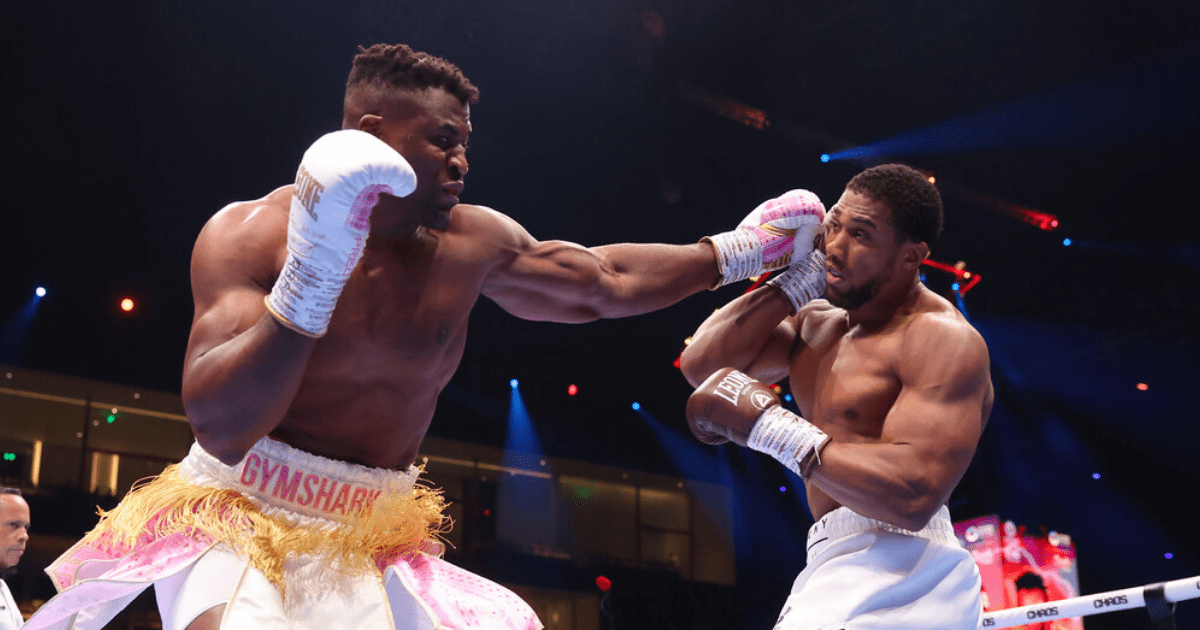Brutal Knockout
British boxer Anthony Joshua faced off against MMA superstar Francis Ngannou in a crossover clash in Saudi Arabia. In a savage moment, Joshua knocked out Ngannou with a brutal right hand, leaving the MMA fighter needing oxygen.
Sharp Performance
Joshua showed his skill early on, knocking down Ngannou with a straight right hand in the first round. He then finished the fight with a powerful overhand right, leaving Ngannou on the canvas.
Reactions from Fans
Fans around the world were shocked by the knockout, with many praising Joshua's performance. One fan mentioned, "AJ showed him there are levels to boxing," while another predicted, "This Joshua will beat Fury badly."
Developing Story
This story is still developing, so stay tuned for updates on this intense crossover fight between Anthony Joshua and Francis Ngannou.

Frequently Asked Questions
How do boxers keep their weight in check and manage their weight classs?
Boxers manage their weight by adhering to strict diets and precise training regimens. They work with nutritionists on a diet plan designed to help them reach their weight target without sacrificing the nutrition and energy needed for training. Exercise and weight monitoring are important, particularly as the fight nears. Weight management is a strategic process that, if done incorrectly, can lead to health issues or poor performance.
How important mental toughness is it in professional Boxing?
Mental toughness and physical conditioning are equally important in professional boxing. The sport requires resilience, focus and the ability to handle stress, as well as the psychological fortitude needed to overcome adversity. Mental preparation is a combination of stress management, visualization and a strong mentality to meet the challenges that are faced in the ring. Without mental toughness a boxer will struggle to perform under the high pressure conditions of professional competition.
What should someone look for in a boxing coach or trainer?
In choosing a boxing instructor or coach, you should consider their experience, track record, coaching style compatibility, and understanding of technical and tactical aspects. A good trainer will also emphasize safety, conditioning, and personal growth. To reach your boxing potential, you need a coach who is able to motivate and communicate well.
What equipment is essential for someone starting in professional boxing?
Equipment essential for those who want to get into professional boxing include boxing gloves, mouthguards, headgears (for sparring) and the right footwear. The use of a heavy, speed, or double-end bag is essential for technical workouts. Quality equipment is important for safety and durability. Subpar gear increases the risk of injury.
Is there an age limit for boxing?
Age restrictions do exist in professional boxing. Most boxing commissions require that boxers be 18 years or older to compete professionally. At the upper end of the spectrum, there is no age limit per se, but physical ability and health will limit an individual’s ability to compete safely. The fitness of older athletes and the risks involved in taking up professional sports must be carefully assessed before they begin.
How long usually does it take for a person to become professional boxer.
The time taken to become an elite boxer is variable. It is dependent on the starting level of the boxer, his/her ability to adapt, and how well he/she trained. It could take a few years of hard work and success as an amateur before a person is ready to become a professional. Some exceptional talent may advance faster, while others might need more development time.
What kind of diet would you recommend for a new boxer?
A beginner boxer should eat a nutritiously balanced diet to fuel intense workouts and encourage recovery. In general, it is recommended that you consume a mixture of carbohydrates for energy and lean protein for muscle growth and repair. Also, vitamins and minerals, as well as hydration, are important. A sports nutritionist will be able to provide a customized diet plan tailored to the boxer’s training regime and weight class goals.
Statistics
- On average, a professional boxer spars between 100 to 200 rounds in preparation for a major fight.
- Professional boxers typically train 4 to 6 hours per day, 5 to 6 days a week, depending on their fight schedule.
- Research shows that a boxer’s reaction time is typically under 0.25 seconds, honed through repetitive drills and sparring.
- Cardiovascular fitness is critical, with a focus on high intensity interval training, comprising up to 40% of a boxer’s conditioning program.
- Less than 10% of professional boxers are undefeated throughout their career, highlighting the sport’s competitive nature.
- A study showed that most professional boxers have spent more than 4 years in training before their first professional bout.
- Around 60% of professional boxers supplement their income with other activities or jobs, due to variability in fight earnings.
External Links
precisionstriking.com
expertboxing.com
boxingnews24.com
boxingscene.com
titleboxing.com
wbcboxing.com
ringtv.com
How To
Boxing Defense: How to improve your defense
Improving defense is as important as perfecting your offense in professional boxing. Include drills that emphasize head movement, footwork and blocking. Practice slipping, bobbing and weaving to avoid punches. Use defensive maneuvers during sparring sessions to create muscle memory under live conditions. Consider your sparring to identify any defensive flaws, then work with your trainer to correct them. Your ability to defend effectively can significantly change the outcome of your fights.

